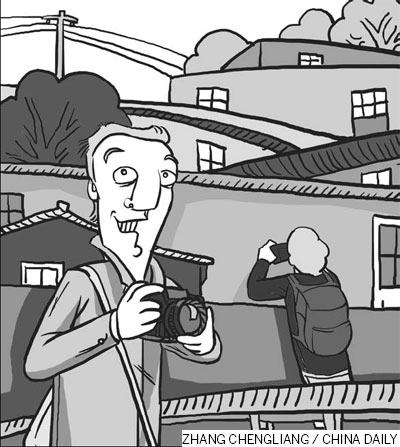

I think a lot of foreigners misunderstand the place hutong have in the hearts of most Chinese.
Many foreigners who come to Beijing drool with admiration whenever they enter one of the old hutong neighborhoods that once dominated the city.
Yet, for the people who live in the oldest and poorest hutong life isn't so good, especially in winter, when most lack proper heating facilities.
I am not surprised that many hutong are being torn down. I think it's fairly obvious that the image China wants to portray to the world isn't an old, dirty hutong. Don't the posters of Beijing's Bird's Nest, Water Cube, and CCTV Tower make that clear enough?
I know some people who are upset the hutong are being leveled. According to them the crumbling, old hutong home, with grass growing on the roof, has some sort of symbiotic relationship with the beating heart of Chinese history. They seem to think that if you tear it down then James Cameron will unleash an army of computer-generated shaolin monk warriors to protect the dignity of Chinese antiquity.
But may I propose that perhaps they really want to protect something else?

I think it is a bit of a stretch to say that old hutong neighborhoods, in their present condition, are a symbol of ancient China. In reality, quite a few simply tourist traps.
Consider one of my experiences. One night I was eating dumplings with friends in a hutong restaurant south of Qianmen when I couldn't stop myself from listening in on a few female tourists in front of me.
"They are so beautiful and amazing," I heard one utter as her friends crowded around her camera to look at pictures they had snapped. Their eyes started to water as one said, "I will never forget this!"
It was so touching, I almost cried too, not because the hutong moved me, but because the restaurant charged 30 yuan for a plate of 15 soggy, tasteless dumplings. However, I must admit that my tears flowed once I left the restaurant to visit one of Qianmen's hutong public bathrooms, but my tears had nothing to do with 5,000 years of Chinese history.
Other popular hutong are on Nanluoguxiang and the area around Houhai Lake. But most of these areas have been commercialized to serve the needs of the foreigners and the fashionable Chinese who visit them.
Seriously do all those bars, cafes and shops where you can buy little trinkets to bring home really make you understand China and its history? Sorry to burst your bubble, but they aren't even a vaguely accurate picture of what the hutong were once like.
Five hundred years ago, the heyday for hutong neighborhoods, people didn't gather there on Saturday night to drink beer and then grind dance with a stranger. In fact, such neighborhoods had nothing to do with the common person at all.
They were the residences of high-ranking Ming Dynasty officials, wealthy merchants and artisans. If you tried to jump the walls surrounding them to dance in the moonlight with friends it would most likely cost you your life.
One reason so many foreigners like the hutong neighborhoods is because they offer them a Westernized Chinese experience of romantic old buildings with a Starbucks down the street and a bar around the corner. I'm not saying any of that is wrong. I enjoy the hutong atmosphere too, but there is so much more to Chinese history and culture than hutong neighborhoods. Most of the noncommercialized hutong that remain are derelict structures most Chinese could not care less about.
If you want to find out more about what China is really like, then maybe you should hop on a train and leave those comfy hutong neighborhoods behind.
| ||||